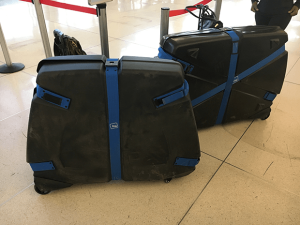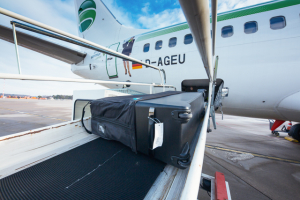We have an evergreen, curated superthread on our Reader Forum called Ministry of Travel. It’s a week old, it’s already busy, and it’s there because of American Airlines’ bike policy from earlier this summer, followed by Delta’s near match in its policy.
When we ask you, 44 percent say you’ll bike will travel underneath you, in the plane’s belly, more often than before because of these new rules. More to the point, if you’re an airline, 1 in 3 of you say you’re likely to change carrier loyalties because of this new policy. And of those who do are loyal to a carrier who doesn’t have this new liberal bike policy (e.g., United as of this writing), 73 percent of you say you intend to change your loyalty. (Even if you clicked that radio button out of frustration and not stark reality, if I were a non-conforming airline I'd be concerned.) Many of the remaining 27 percent say you just can’t change your loyalty because of the airport you use.

On the Ministry of Travel thread the issue has come up, and unique bike cases like the B&W Bike Box II (below) I recently reviewed is a – pardon the pun – case in point: Is there a way to inoculate yourself against the TSA agent who doesn’t repack your bike correctly? I had a conversation with TSA’s media liaison, Lorie Dankers, and BrookHunter Whelchel, a transportation security manager at Sea-Tac Airport (Seattle).
My specific question for Mr. Whelchel was, “Is it appropriate - is there a convention known to TSA agents - that we as travelers ask TSA for an inspection of our bikes in our presence?” The answer is yes.
The protocol is, “Let the air carrier know when your bag is checked that you want the bag to be screened in the traveler’s presence,” according to Mr. Whelchel. “Let the air carrier know, they’ll direct you to the on-site [TSA] station; there may be someone from the airline present, assisting the TSA officer. If the passenger says ‘I’d like to be present,’ that’s perfectly fine.”

“For the actual screening process, the officer will open up the bag, do a sampling of the inside of the bag, move around items in the bag, sample the toiletry bag, the bike repair kit, if there are no alarms or security threats, the agent will repack the bag while the passenger is there.” Mr. Whelchel added that, “For security the passenger can’t repack the bike, however the passenger can guide the officer when repacking the bag, same as we do with passengers with firearms and pets.”
I asked if this was limited to certain airports or universally available and Ms. Dankers said, “Because every airport has a unique config, sometimes you’ll encounter something a little different, but what is across the board is the access to make that request. TSA will try to work with that traveler within the limits and the airport and its footprint.”
These TSA folks asked that I relay to you all a particular limitation to this. Every piece of baggage on a plane that originates outside the U.S. that connects to a flight inside the U.S. will be subject to search, and that won’t be done in the presence of the traveler. This includes flights from U.S. carriers. For example, last month I flew on an American Airlines flight from Madrid to Ontario, California, changing planes at Dallas DFW. My bike case was, presumably, inspected at DFW. I asked if TSA has pre-screening in any foreign airports, such as is the case with U.S. immigration, and the answer is no. I asked if there are any countries that have screening relationships with the U.S., where if a plane originates in Ireland or Israel that by virtue of their comprehensive, qualifying screening that baggage is not TSA screened at American hubs. Nope.
I asked about guidance on the lithium batteries that are used in bikes with electronic shifting – both the batteries installed on the bikes and spare batteries we might take in either checked or carry on baggage. And, while there is watt hours guidance already listed, I was surprised to find out that TSA has nothing to do with batteries. “It’s a safety issue, not a security issue,” said Mr. Whelchel, “so the FAA will need to provide that guidance.” Ms. Dankers kindly offered to help me find my correct liaison at the FAA for this, and when I know you’ll know. I'll ask about CO2 cartridges as well.



